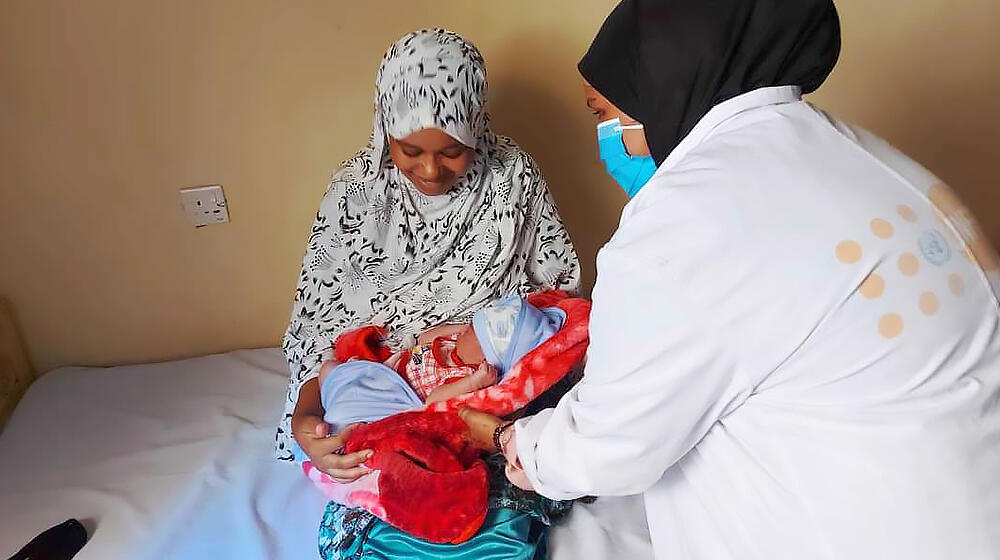This year’s theme for World Patient Safety Day, on 17 September, is “safe maternal and newborn care”, aiming to encourage stakeholders to act for safe and respectful childbirth.
According to Ms. Habiba Haji Osman, Somalia can do better in ensuring patient safety. Ms. Osman has some 40 years of experience serving as a midwife herself and educating other midwives in both urban and rural settings in the country. She works at Baidoa Midwifery Training as deputy principal and tutor, and UNFPA supports the school.
Ms. Osman says that she has witnessed countless mothers and children lose their lives over the years due to a lack of trained and accessible midwives who could facilitate a safe delivery.
“Midwives are the trusted companions of women throughout their pregnancy, birth, and the period following childbirth. Midwives play a vital role in assisting women, ensuring healthy pregnancies, and making it a positive experience. We, therefore, need many more midwives
According to the World Health Organisation (WHO), safe and effective midwifery care can avert 83 percent of all maternal deaths, stillbirths, and newborn deaths.
In Somalia, some of the most significant barriers for accessing safe maternal and newborn care are the lack of women’s decision-making power regarding when and where to seek lifesaving intervention; the lack of equipment and supplies; the unavailability of trained, competent birth attendants who can effectively manage maternal and newborn complications, as well as complications arising from Female Genital Mutilation (FGM), civil unrest and poverty.
Ms. Osman believes that Somali midwives are significantly contributing to reducing the maternal mortality rate in the country. She explains that the midwives are trained using standards set by the International Confederation of Midwives (ICM), an accredited non-governmental organisation representing midwives and midwifery to organisations worldwide to achieve common goals in the care of mothers and newborns.
“During the training of UNFPA-supported midwifery students, we teach them universal precaution for infection prevention and control, so that they can provide safe maternal and newborn care,” says Ms. Osman. “One of the roles I enjoy the most is educating midwifery students on the ICM competencies and offering advice and guidance to other midwives when they need to solve challenges in their work,” she continues.
The midwifery trainer also serves as the focal point for the Somali Midwives Association (SOMA) in the South West State of Somalia. SOMA is a non-profit professional association working with midwives and civil society to improve maternal health services by developing the midwifery profession in the country.
Ms. Fatima Mohamed, a clinical instructor at Mogadishu Midwifery school, which UNFPA also supports, adds her voice about the importance of trained and qualified midwives in ensuring quality maternal and neonatal care. “UNFPA-trained midwives have a positive impact on safe delivery. They’re making a difference in both the public and private sector, providing safe maternal and newborn care,” says Ms. Mohamed.
UNFPA Somalia Midwifery Specialist Ms. Hawa Abdullahi Elmi explains that Somalia has a severe shortage of midwives and that investing more in quality midwifery education is needed now more than ever to increase equity of service distribution, particularly in the rural setting where access to safe maternal and newborn care is limited.
“Supporting midwives through an enabling working environment leads to better care, and we need to improve on this too,” says Ms. Elmi.
She said midwives could solve todays’ three most outstanding challenges in Sexual, Reproductive, Maternal, Newborn and Adolescent Health (SRMNAH), preventing neonatal deaths, stillbirths, and maternal deaths. “However, while delivering accessible, equitable, and high-quality SRMNAH, midwives are also experiencing restrictions and limitations on the kind of care they can provide, as well as unfair treatment, lack of trust and recognition from medical staff, and low levels of compensation and promotion,” says Ms. Elmi.
Ms. Halima Ali, from Somali Midwifery Association. worries that in Somalia, midwives prefer to work in urban settings. “This is mostly because there is no hardship allowance allocated for midwives who work in a rural setting with difficult working conditions,” explains Ms. Ali.
In 2019 UNFPA has supported the development of a policy for posting and retention for midwives by the Ministry of Health Somalia Federal Government. The policy is yet to be fully implemented.
There is no specific data for available midwives in Somalia, but UNFPA has supported the training midwives of about 2,000 midwives. A 2015 WHO report revealed that Somalia needs 20,000 more midwives.



